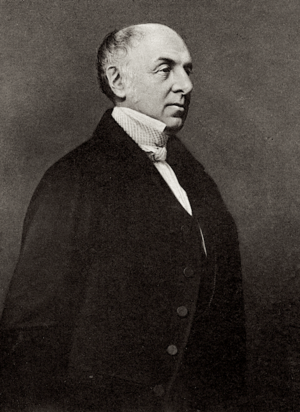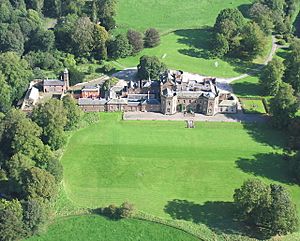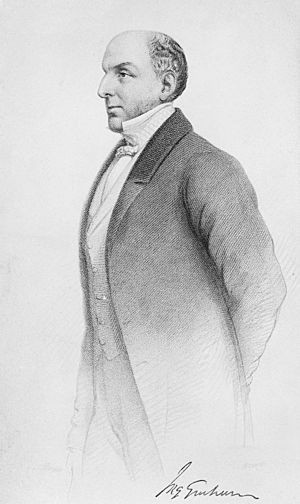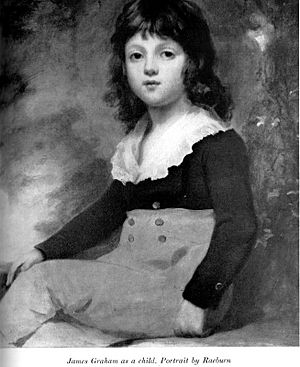Sir James Graham, 2nd Baronet facts for kids
Quick facts for kids
Sir James Graham
|
|
|---|---|
 |
|
| Home Secretary | |
| In office 6 September 1841 – 30 June 1846 |
|
| Monarch | Victoria |
| Prime Minister | Sir Robert Peel |
| Preceded by | The Marquess of Normanby |
| Succeeded by | Sir George Grey |
| First Lord of the Admiralty | |
| In office 22 November 1830 – 7 June 1834 |
|
| Monarch | William IV |
| Prime Minister | The Earl Grey |
| Preceded by | The Viscount Melville |
| Succeeded by | The Lord Auckland |
| In office 30 December 1852 – 13 March 1855 |
|
| Monarch | Victoria |
| Prime Minister | The Earl of Aberdeen The Viscount Palmerston |
| Preceded by | The Duke of Northumberland |
| Succeeded by | Sir Charles Wood |
| Personal details | |
| Born | 1 June 1792 Naworth, Cumberland |
| Died | 25 October 1861 (aged 69) Netherby, Cumberland |
| Nationality | British |
| Political party | Whig (1818–1835) Conservative (1835–1846) Peelite (1846–1859) Liberal (1859–1861) |
| Spouse | Frances Callander (d. 1857) |
| Alma mater | Christ Church, Oxford |
Sir James Robert George Graham, 2nd Baronet (born June 1, 1792 – died October 25, 1861) was an important British politician. He served as the Home Secretary and the First Lord of the Admiralty. These were very powerful jobs in the British government. He was the oldest son of Sir James Graham, 1st Baronet.
In 1819, he married Fanny Callander. She was the daughter of Sir James Campbell. Sir James Graham received an important degree from the University of Cambridge in 1835. He was also the Lord Rector of the University of Glasgow in 1840.
Graham was in charge of the Royal Navy as the First Lord of the Admiralty from 1830 to 1834. He later became the Home Secretary from 1841 to 1846. He was again First Lord of the Admiralty from 1852 to 1855. He was also a member of the Council of the Duchy of Lancaster. He served as a Deputy Lord Lieutenant for Hertfordshire.
Sir James Graham was a Member of Parliament (MP) for many different areas. These included Kingston upon Hull, St Ives, Carlisle, East Cumberland, Pembrokeshire District, Dorchester, and Ripon. He was an MP for Carlisle when he died in 1861. Graham Land in Antarctica is named after him.
Contents
Early Life and Education
James Graham was born in Naworth, Cumberland. His father was Sir James Graham, 1st Baronet. His mother was Lady Catherine. He went to a private school in Dalston. Later, he studied at Westminster School and Christ Church, Oxford.
After two years at Oxford, he traveled abroad. During the Napoleonic Wars, he worked as a private secretary for Lord Montgomerie. Lord Montgomerie was a British diplomat in Sicily. When Lord Montgomerie became ill, James Graham took over his duties. He even helped with talks that led to Joachim Murat separating from Napoleon. After the war, he returned to England. In London, he became good friends with Wilfrid Lawson, who also became a politician.
Starting a Political Career
Becoming a Whig Politician
Back in London, James Graham became very interested in politics. Even though his father was a strong Tory, James joined the Whig party. In 1818, he decided to run for Parliament in Hull. People called him the "Yorkshire Dandy" because he dressed well and spoke with fancy words.
He promised to support:
- Changes to Parliament
- Getting rid of unnecessary jobs and pensions
- Peace
- Saving money
- Ending the slave trade
- More religious and civil liberties
After a close election, Graham became an MP for Hull. However, it cost him a lot of money. In 1820, a new king, George IV, came to power, which meant a new election. Graham lost support in Hull. So, he ran and won the seat for St Ives. He continued to push for saving money in government. However, he resigned from this seat when he was accused of issues during the election.
Improving His Family Estate
Graham returned to Cumberland. He started to improve his family's land at Netherby. He wanted to help both the landowners and the farmers who rented land. First, he forgave all the debts his tenants owed him. He also made the farms more efficient. He rebuilt buildings, added drains to wet land, and improved the animals on the estate. He spent a lot of money on these improvements over 20 years.
He also studied the Corn Laws. These laws affected the price of food. He wrote a paper called "Corn and Currency." In it, he argued that free trade would be better for landowners. He believed that high taxes on foreign corn did not help British farming. He said these taxes should be lowered. He thought high food prices helped landowners but hurt workers. He was a strong supporter of free trade and free banking. He also helped start the Society for the Prevention of Cruelty to Animals, which later became the RSPCA.
In 1824, he inherited his father's title, becoming the 2nd Baronet.
In Parliament: Representing Cumberland
In 1826, Graham became an MP for Carlisle. He supported the same ideas he had in Hull. In 1828, he became the MP for Cumberland. This election was not contested, meaning he won without anyone running against him.
In 1830, Graham became well-known in Parliament. He suggested reducing government salaries. This made him seem like an advanced reformer. Later that year, Earl Grey offered him the job of First Lord of the Admiralty. This meant he was in charge of the Royal Navy. He also became a member of the Privy Council.
Graham helped create the Great Reform Act of 1832. This law changed how people voted and gave more people the right to vote. From 1832 to 1837, he was an MP for East Cumberland.
Changing Political Parties
By 1834, Graham was a successful minister. The navy was improved, and peace was secured in Europe. However, there were problems in Ireland. Many Irish Catholics were unhappy about paying tithes (church taxes) to the Church of Ireland.
The British government proposed a law to change the Church of Ireland. This law would reduce the number of bishops and archbishops. It would also use money saved from these changes to help parishes. Graham believed that the unity of Britain and Ireland depended on the church. He thought changing the church would cause problems. So, he resigned from the government. Other important politicians also resigned with him.
In January 1835, Graham was re-elected without opposition. He told his supporters he still believed in peace, saving money, and reform. However, on June 30, 1835, Graham changed his political party. He joined the Tories. This made many of his old Whig supporters unhappy.
Losing Support in Cumberland
Graham's change of parties upset many of his supporters in Cumberland. In 1837, a new election was called. Over 2,500 people in the county wanted to elect two different Whig candidates instead of Graham. On election day, many people came to support the reform candidates. They carried flags and banners that showed their disapproval of Graham. Graham found it hard to speak because of the noise. He lost the election. This ended his political influence in his home county.
Serving in Government Again
Home Secretary Role
In 1838, Graham returned to Parliament as the MP for Pembroke in Wales. He won this election without opposition. In 1838, he was also elected Rector of the University of Glasgow.
In 1841, Graham became the MP for Dorchester. Sir Robert Peel became Prime Minister and chose Graham to be his Home Secretary. This was a very important job, like being in charge of law and order for the country.
In 1842, Graham tried to improve state education in industrial areas. He wanted to change the Factory Acts to limit children's work hours and provide more education. His new plan would limit children aged 8-13 to 6.5 hours of work and 3.5 hours of education daily. Women and young people would work a maximum of 12 hours. However, there was a disagreement between different religious groups, so the plan was delayed. Graham brought the bill back in 1843. After a big debate, the bill finally became law.
As Home Secretary, he also faced criticism in Scotland for his policies on the church.
Mazzini Letters Controversy
In 1844, people in Parliament found out that some letters had been opened and copied. These letters belonged to Giuseppe Mazzini, an Italian freedom fighter. Graham, as Home Secretary, had allowed this to happen. The letters showed that Mazzini's friends planned an uprising in Italy. This information was then shared with other countries. When Mazzini's friends landed in Italy, they were killed.
Many people criticized Graham for this. A special committee in Parliament looked into it and said the government had done nothing wrong. But the discussion continued. Graham strongly defended his actions. He said the Home Secretary had the power to open letters in certain cases. Even though the government survived the vote, this event stayed with Graham. He later said that people would only remember him as "the man who opened the letters of the Italians."
Supporting Free Trade
At first, Graham was not fully in favor of major changes to the Corn Laws. He believed that getting rid of them would harm British farming. However, by 1842, his views started to change. He played a big part in a new policy that included:
- A sliding scale for taxes on corn prices.
- Bringing back income tax.
- Big changes to other tariffs (taxes on imported goods).
Old bans on imports were removed. Taxes on raw materials, partly made goods, and finished products were limited. It was thought that reducing taxes on many items would lead to more trade and production. In 1843, Graham said that "free trade" ideas were just common sense.
In 1845, with Graham's support, many more items became tax-free. All export taxes were removed. In 1846, Prime Minister Robert Peel proposed that the Corn Laws be ended completely by 1849. This was a very big change. Some politicians, like Benjamin Disraeli, strongly opposed this. They argued it would hurt landowners and change Britain's traditional system.
On May 15, 1846, Parliament voted to repeal (end) the Corn Laws. The Duke of Wellington convinced the House of Lords to pass it too. On the same night, a bill Graham supported was defeated. On June 29, Peel resigned as Prime Minister. The Conservative Party split, and the Whigs formed a new government. Those Conservatives who supported Peel, including Graham, were called Peelites.
As a Peelite Politician
In the 1847 election, Graham became the MP for Ripon. He had left his old political club. Even though he was offered important jobs by both sides, he stayed loyal to Peel. He was against any return to the old trade laws. He believed that ending the Navigation Acts was important for progress.
After Peel died, Graham and the Earl of Aberdeen became the unofficial leaders of the Peelite group. Graham lost support in Ripon. But then, almost 500 voters in Carlisle asked him to run there. On July 7, 1852, Graham won the election in Carlisle. He joked about the old trade laws, calling them "outdoor relief to distressed landlords." He also said he still supported careful reforms.
In December 1852, a new government was formed. It was a mix of Whigs, Peelites, and Liberals. Lord Aberdeen became Prime Minister. Graham returned to the Cabinet as First Lord of the Admiralty. Soon after, Britain and France became involved in the Crimean War with Russia. Graham ordered the British fleet to sail into the Black Sea. In 1854, Queen Victoria honored Graham for his service.
However, the war dragged on, and the navy's actions seemed slow. Graham was criticized for choosing Sir Charles Napier to lead the fleet in the Baltic. Sir Charles was unhappy because he was not allowed to attack strong fortresses. Graham was not entirely to blame, as stopping the Russian fleet was important. On January 29, 1855, a motion was passed asking for an investigation into the war. Three weeks later, Aberdeen and Graham resigned.
In 1857, Graham disagreed with Lord Palmerston's actions in Canton, China. Even though this was unpopular, he was re-elected in Carlisle. The Peelite party had mostly disappeared by this time. In 1859, Graham was re-elected in Carlisle, and he and his nephew became Liberal MPs. Later that year, Graham and other like-minded members formed the Liberal Party.
On October 25, 1861, Sir James Graham died at the age of 69.
Family Life
Graham married Frances ("Fanny") Callander on July 8, 1819. She was known for her beauty. She died in October 1857. Graham died at Netherby, Cumberland. His son, Frederick, inherited his title.
He was the godfather of James Graham Goodenough, who was named after him.
Images for kids
 | Dorothy Vaughan |
 | Charles Henry Turner |
 | Hildrus Poindexter |
 | Henry Cecil McBay |







